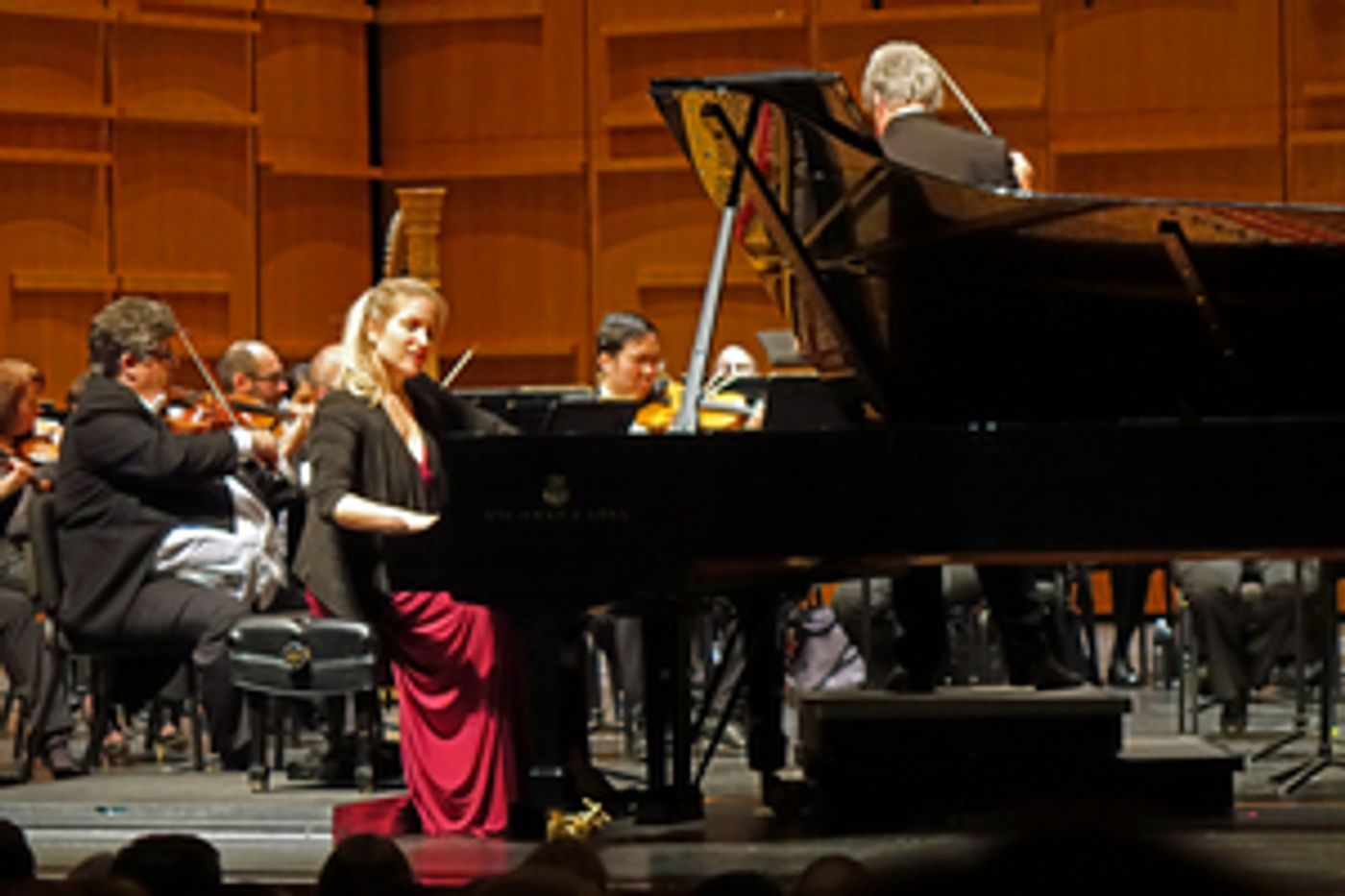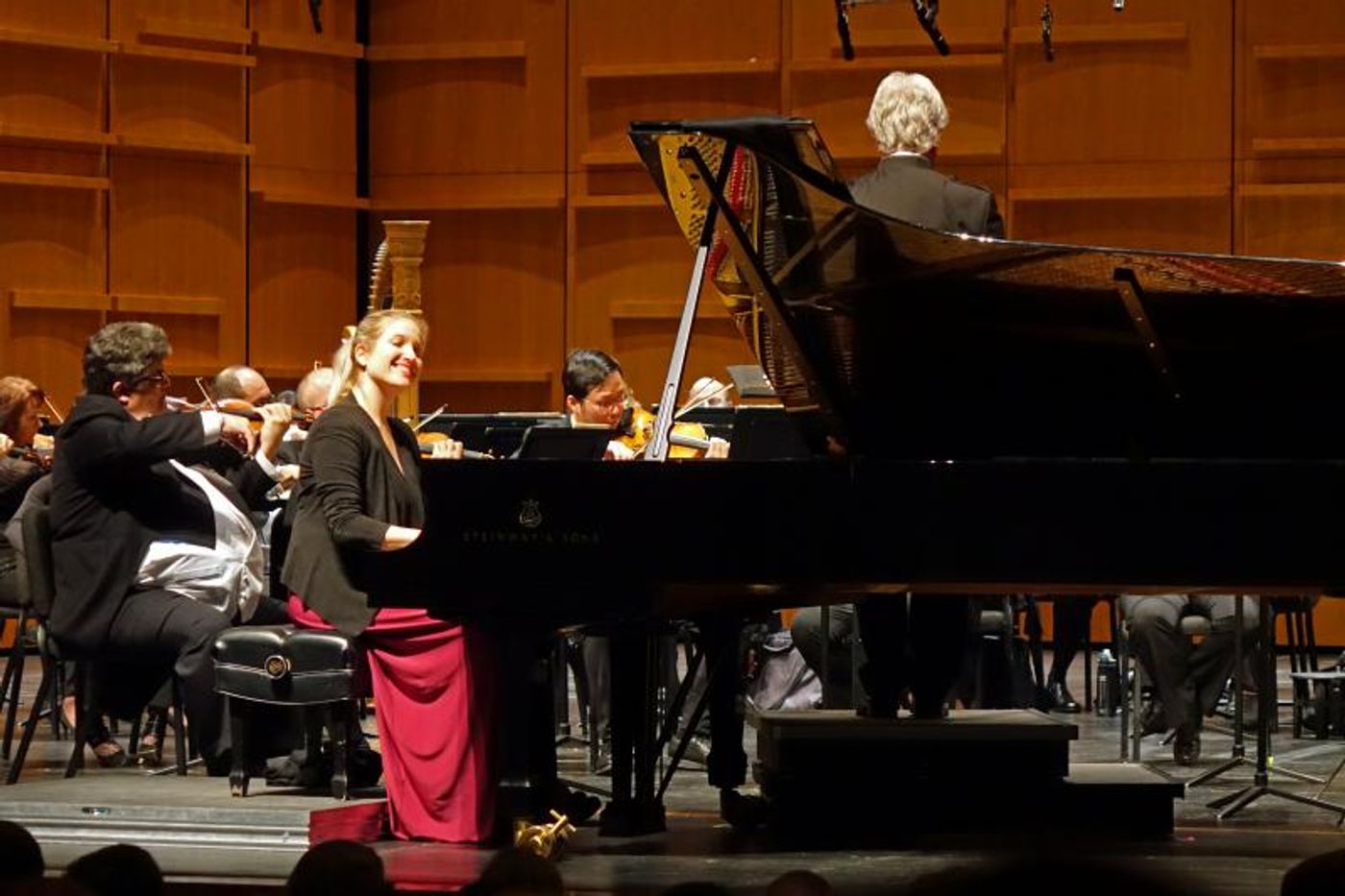Review: Symphony Bolsters CHOPIN PIANO CONCERTO With Improved Beethoven

You can't really say that Christopher Warren-Green was between Beethoven concerts when he stepped to the podium at Knight Theater for a program headlined by CHOPIN PIANO CONCERTO NO. 1 and a guest shot by Gabriela Martinez. In his last appearance at the Knight in January - before Charlotte Symphony resident conductor Christopher James Lees pinch-hit with an all-American program later in the month - Warren-Green launched Beethoven's 250th birthday year with an evening that included the Leonore Overture and the "Emperor" Piano Concerto.
Ludwig Van's Missa Solemnis, with four guest vocalists and the Charlotte Master Chorale joining CSO at Belk Theater, is next up for Warren-Green in March, but our maestro wasn't giving Beethoven a complete night off, even though his program already sported a Valentine's Day subplot. Instead, after a delicious sprig of music from Frederick Delius, Symphony No. 8 sent us on our way home. No, Warren-Green wasn't exactly between Beethovens, but it might have been better if he had been.
The evening did not begin auspiciously, that's for sure. Warren-Green, for the first time I can remember, brought a Symphony performance to an abrupt halt soon after beginning a performance of Tchaikovsky's Romeo and Juliet Fantasy Overture. Disturbed by people who were coughing in the front rows (which I didn't actually hear), Warren-Green whirled around and, slightly exaggerating his own pique, urged all the coughers to "just let it out!" and be done.
Shortly afterwards, a woman in the front row scurried to nearest exit, apparently more hurried and distressed than she might have been if she had thought Warren-Green were joking. Meanwhile, Symphony's music director whirled back to his musicians and relaunched as abruptly as he had just aborted. Surprisingly after such curtness, the monastic calm of the Friar Lawrence prelude was played as exquisitely as if the orchestra had observed a minute of meditation before embarking, with beautiful highlights from the trombone and flute. The raucous section, depicting family strife between the Montagues and the Capulets, came thrillingly after a slow simmering keyed by the harp, the violins and the timpani came to a boil.
The repeated swellings heralding the famous rhapsodic R&J love theme were as sensitively rendered as you could ask, and the concluding section was haunting in its funereal solemnity. Alas, the love theme itself, perhaps the most well-worn melody in classical music - think of all the times you've heard it! - sounded somewhat hackneyed to me, despite Symphony's laudable forbearance, not having performed it in their mainstage Classics Series since 2011.

I doubt many CSO members had ever performed the featured Chopin concerto in Charlotte before. The last time it appears on my radar was when Emanuel Ax played it in 1998 - with the visiting Saint Paul Chamber Orchestra. Known primarily for his piano compositions, Chopin launches into his PIANO CONCERTO NO. 1 with surprisingly lush and virile orchestral writing in the Allegro maestoso: brass, flutes and French horns striding into the mix as the long intro climaxes. Although Warren-Green and Symphony were aggressive in their attitude, Martinez took a more leisurely approach, downplaying the inner dialectic between longhair rigor and liquid lyricism in the early piano soloing, settling instead into a groove that underscored the Concerto's affinity with Chopin's Nocturnes. Only toward the end of the movement did Martinez build toward cadenza-level intensity.
While I admired Martinez's delicate touch in the treble, her firm left hand patrolling the bass, and her overall technique, the full exquisiteness and drama of the middle Romanze movement somehow eluded her in her earthbound phrasing. Far more satisfying was the concluding Rondo, where she captured the dancing vivacity of the music, sometimes recalling the sprightly charms of Chopin's Waltzes and sometimes evoking the more emphatic stomp of the Polonaises. Just as importantly, Martinez and the CSO seemed to be having a jolly time, which did not preclude her showing off a bit. Indulging in those delights, however, Martinez missed the poignancy and drama you'll find at the end of Murray Perahia's recorded version.
The piece by Delius, "The Walk to the Paradise Garden," was as dreamy and tropical as you would expect, from a British composer who has likely captured the soul of primeval Florida better than any American. Really lovely passages played by principal oboist Hollis Ulaky and principal clarinetist Taylor Marino were an intoxicating intro to Delius's special allure, but Warren-Green and his orchestra seemed to back away from delivering the full drama of this operatic extract when the music swelled.
Perhaps the maestro and his ensemble had the context of this composition in mind, coming in Delius's A Village Romeo and Juliet just before the lovers fulfill a suicide pact. The lovely performance didn't have any more of a depressing effect on me than the Tchaikovsky overture had, but it seemed to dampen spirits onstage. It's quite possible that the opening of Beethoven's Allegro vivace was the most perfunctory playing I have heard from CSO since the last time they programmed Symphony No. 8 in 2009, a distinctively tepid outing led by former music director Christof Perick.
This time, the orchestra gradually hit their stride after circling back to the main theme, though I still wanted a little more kettledrum éclat in the ensemble explosions. In the ensuing Scherzo, a little more stealth in the soft sections and a little more mock ferocity - like Warren-Green's attitude toward the coughers earlier? - would have helped. Symphony already had the measure of the Menuetto in 2009, the one movement Perick salvaged, and they maintained their mastery here. Launching with a zesty attack, Warren-Green brought forth the folksy energy in rotation with a wan beerhall merriment and an idyllic refuge for the woodwinds.
The F major Symphony is bookended with Allegro vivace movements, and the last is prime Beethoven, quietly churning at the outset with an inevitable outbreak of irrepressible joy. Warren-Green coaxed both the expectancy and the jubilant payload from the orchestra - plus all the surprises, detours, misdirection, and impassioned releases that make Beethoven so worth revisiting and celebrating, 250th birthday or not. The French horns didn't mess up as they had in 2009, this time around teaming up with the brass in a rousing finish.
Reader Reviews

Videos

